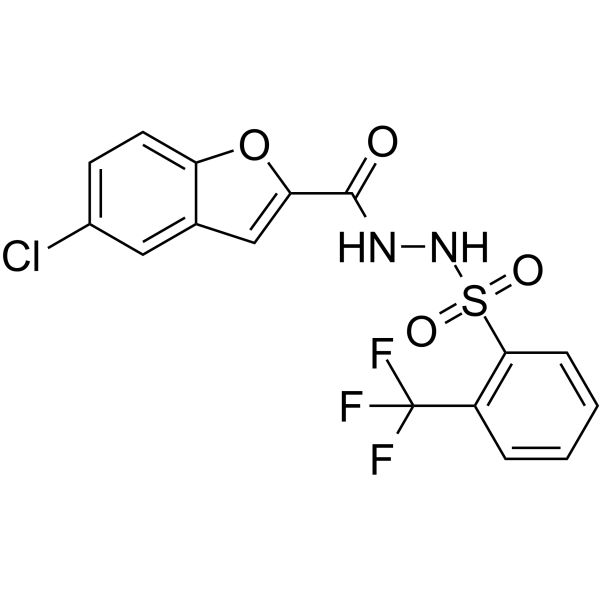
BCATc Inhibitor 2
CAS No. 406191-34-2
BCATc Inhibitor 2( —— )
Catalog No. M27500 CAS No. 406191-34-2
BCATc Inhibitor 2 exhibited an IC50 of 0.8 microM in the hBCATc assays; it is an active and selective inhibitor.
Purity : >98% (HPLC)
 COA
COA
 Datasheet
Datasheet
 HNMR
HNMR
 HPLC
HPLC
 MSDS
MSDS
 Handing Instructions
Handing Instructions
| Size | Price / USD | Stock | Quantity |
| 2MG | 67 | Get Quote |


|
| 5MG | 110 | Get Quote |


|
| 10MG | 177 | Get Quote |


|
| 25MG | 372 | Get Quote |


|
| 50MG | 556 | Get Quote |


|
| 100MG | 791 | Get Quote |


|
| 200MG | Get Quote | Get Quote |


|
| 500MG | Get Quote | Get Quote |


|
| 1G | Get Quote | Get Quote |


|
Biological Information
-
Product NameBCATc Inhibitor 2
-
NoteResearch use only, not for human use.
-
Brief DescriptionBCATc Inhibitor 2 exhibited an IC50 of 0.8 microM in the hBCATc assays; it is an active and selective inhibitor.
-
DescriptionBCATc Inhibitor 2 exhibited an IC50 of 0.8 microM in the hBCATc assays; it is an active and selective inhibitor. BCATc Inhibitor 2 also blocked calcium influx into neuronal cells following inhibition of glutamate uptake, and demonstrated neuroprotective efficacy in vivo. Branched-chain amino acid transferases (BCATs) have been implicated in catalyzing reversible transamination of isoleucine, leucine, and valine branched-chain amino acids to their corresponding α-keto acids, generating L-glutamate. It has been identified that there are two forms of BCAT in mammals: mitochondrial BCAT (BCATm) and cytosolic BCAT (BCATc). BCATc is expressed in particular brain region and involved in regulating glutamate synthesis for release during neuronal excitation. Thus, BCATc inhibition may be useful for the treatment of neurodegenerative and behavioral disorders involving disturbances of the glutamatergic system.(In Vitro):BCATc inhibition is likely to be useful for the treatment of neurodegenerative and other neurological disorders involving disturbances of the glutamatergic system. In the hBCATc assays, BCATc Inhibitor 2 exhibited an IC50 of 0.8 ± 0.05 μM. In a recombinant rat BCATc assay and a crude rat BCATm assay, the IC50 was 0.2 μM ± 0.02 and 3.0 μM ± 0.5 (n=5), respectively. BCATc Inhibitor 2 decreased calcium influx in neuronal cultures with an IC50 of 4.8 ± 1.2 μM (n=4) .(In Vivo):BCATc Inhibitor 2 blocked calcium influx into neuronal cells following inhibition of glutamate uptake, and demonstrated neuroprotective efficacy in vivo. In Lewis rats, after treatment with 30 mg/kg BCATc Inhibitor 2 (subcutaneous injection), the peak plasma concentration (Cmax) reached 8.28 μg/ml at 0.5 h (tmax). The mean plasma exposure (AUC) value was 19.9 μg h/ml, and the mean terminal half-life ranged from 12 to 15 h, indicating favorable PK parameters of BCATc Inhibitor 2. Daily administration of the mitochondrial neurotoxin, 3-nitroproprionic acid (3-NP) produced striatal lesions and led to motor deficits. Administration of BCATc Inhibitor 2 for 9 days almost completely reversed the effects of 3-NP .
-
In Vitro——
-
In Vivo——
-
Synonyms——
-
PathwayOthers
-
TargetOther Targets
-
Recptor——
-
Research Area——
-
Indication——
Chemical Information
-
CAS Number406191-34-2
-
Formula Weight418.77
-
Molecular FormulaC16H10ClF3N2O4S
-
Purity>98% (HPLC)
-
SolubilityIn Vitro:?DMSO : 250 mg/mL (596.99 mM)
-
SMILESFC(F)(F)c1ccccc1S(=O)(=O)NNC(=O)c1cc2cc(Cl)ccc2o1
-
Chemical Name——
Shipping & Storage Information
-
Storage(-20℃)
-
ShippingWith Ice Pack
-
Stability≥ 2 years
Reference
1.Yingjun Zhang, et al. Sulfonamide derivatives and pharmaceutical applications thereof. EP3134392B1
molnova catalog



related products
-
hVEGF-IN-1
hVEGF-IN-1 inhibits human VEGF-A translation and has antitumor activity.
-
Transketolase-IN-4
Transketolase-IN-4 is a transketolase inhibitor with an IC50 value of 3.9 μM.Transketolase-IN-4 inhibited Mycobacterium tuberculosis DXS with an IC50 value of 114.1 μM.
-
GL3
GL3 encodes a bHLH protein that regulates trichome development in arabidopsis through interaction with GL1 and TTG1.



 Cart
Cart
 sales@molnova.com
sales@molnova.com


